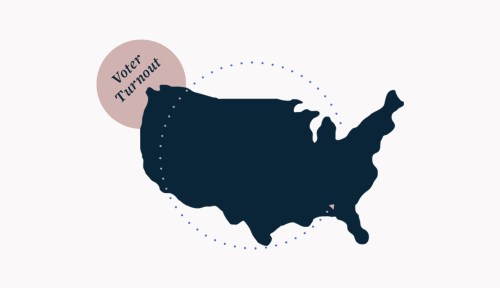5 Ways You Can Help To Increase Voter Turnout Ahead of the Georgia Runoff Elections
Two Georgia runoff elections could give Biden the Senate support he needs to follow through on his plans. Here's how you can help.

What President-elect Joe Biden will be able to accomplish in the White House depends heavily on which party controls the United States Senate. Residents of Georgia will head back to the polls on January 5 to vote in two runoff elections that could evenly split the number of Republicans and Democrats. As vice president, Kamala Harris‘s vote will break any tie, giving Biden the edge he needs to follow through on his plans for climate change, family care, and more.
In a video posted to Twitter on Friday, Stacey Abrams, who narrowly lost her 2018 race for Georgia governor, underscored the importance of the upcoming runoff elections.
“As we continue to make sure that every vote is counted and every voice is heard, our work is not done in Georgia,” says Abrams. “We have two Senate runoff elections on January 5. My friends Jon Ossoff and Rev. Raphael Warnock are on the ballot and control of the United States Senate [will] come down to these two races. That means access to health care and access to justice are still on the line.”
Abrams almost single-handedly turned Georgia into a battleground state. With her organizations Fair Fight and Fair Count, Abrams worked to break down systemic barriers to voting and registered at least 800,000 voters in her home state. And she’s confident with continued work, Ossof and Warnock can still win.
Ossof serves as the CEO of Insight TWI, a media production company that investigates issues like sexual slavery of women and girls by ISIS and foreign officials who steal U.S-funded food and medical aid. Before becoming a journalist, he served as a national security aide for a Georgia congressman, handling defense, foreign affairs, intelligence, and economic policy. The November 3 vote was close, with Ossof winning 47.9 percent of the vote and incumbent opponent David Perdue receiving 49.7 percent. However, neither reached the required 50 percent of the vote to be declared the winner.
Warnock is currently the senior pastor at Ebenezer Baptist Church in Atlanta, the former church of the Rev. Dr. Martin Luther King, Jr. The son of a preacher, he grew up in public housing in Savannah, Georgia. He plans to advocate for struggling Georgia families by focusing on issues like quality, affordable health care and better pay for working people. With 20 people running for one seat, no candidate came close to reaching the 50 percent of votes needed to win. However, Warnock received 32.9 percent of the vote, more than any other candidate.
Whether or not you live in Georgia, there are ways you can help these two candidates make it to Washington, D.C.
How to help the in the Georgia runoff elections
1. Donate
Going into a runoff election means that these candidates have to campaign for another two months, and that isn’t cheap. To help, you can donate to Fair Fight. The PAC is splitting donations three ways to fund its own efforts as well as both Ossof’s and Warnock’s campaigns. Additionally, you can donate toBlack Voters Matter, an organization that aims to increase voter registration and expand voting rights and access.
2. Make phone calls and send text messages
It’s hard enough to get voters to turn out on Election Day, so getting people to the polls for a runoff election takes a lot of work. Whether or not you live in Georgia, you can sign up to make phone calls or send text messages on behalf of the Ossof and Warnock campaigns and Black Votes Matter.
3. Knock on doors
If you live in Georgia or are willing to travel, you can sign up to go door-to-door in Georgia, speaking to people about the runoffs, and helping them to create a voting plan for January 5.
4. Become a poll worker
Because of the pandemic, poll workers are needed more than ever. A lack of trained poll workers can lead to long lines, an issue Georgia already faces when there isn’t a pandemic. Long lines are a form of voter suppression, as they can deter or prevent voters from voting. If you’re a resident of Georgia, you can sign up to be a poll worker.
5. Talk about this election with family and friends
The most trusted messengers are the people we speak with regularly. Once you’re up-to-date on what’s happening, you can share what you know about these runoff elections with people in your circle, which can inspire them to do their part.
Sign Up for Our Daily Newsletter
Get all the latest in wellness, trends, food, fitness, beauty, and more delivered right to your inbox.
Got it, you've been added to our email list.








